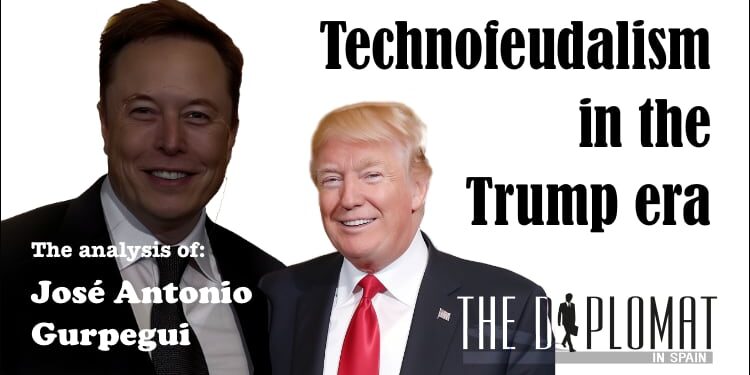SUMMARY
What will Donald Trump’s next term in the White House be like? If he eventually controls the House of Representatives in addition to the Senate, will he be, as he himself has said, “dictator only on day one”? If anything, will his rise represent a substantial change in the country’s democratic model? And what consequences will it have for international politics at this time?
José Antonio Gurpegui / Instituto Franklin
One of the most repeated mantras by Democratic leaders during the last US election campaign had to do with the danger that the eventual victory of the Republican candidate Donald Trump represented for American democracy. His refusal to accept the election results, those of 2020, endorsed by all the courts that have ruled on the matter, his polemic temperament and authoritarian ways with xenophobic and misogynist overtones, the foul contempt shown towards his political opponents, and even statements by close collaborators linking him intellectually to Hitler, were conducive to such precaution.
However, in the last four years he has managed to stay alive despite vicissitudes of all kinds, such as the assault on Congress, the poor results in the mid-term elections, condemnatory judicial sentences, the confrontation with co-religionists and collaborators… For any other politician this type of events, just one of them, would have meant his immediate fall and his definitive descent into hell. Well, the elections have already taken place and as of January 20, the Republican will once again sit in the Oval Office.
His has been an unappealable victory in both substance and form, for not only has he won the necessary number of electoral votes, as he did 8 years ago, but he has also crushed his opponent in the popular vote. Donald Trump has increased the number of his voters by slightly more than 1 million with respect to 2020, while Kamala Harris has lost 10 million with respect to the result obtained by Biden. This fact has had repercussions in all states, regardless of whether they voted Democrat or Republican, in all voter segments -white men, women, young people, ethnic groups…-, and in rural areas as well as in cities.
It is obvious that the apocalyptic messages predicting the end of liberal democracy launched by Barack Obama, Joe Biden, and Kamala Harris have fallen on deaf ears. The 10 million votes lost by Harris is the same as the number of abstainers in one election compared to the other – 158 million voters in 2020, 148 million in 2024. Does Trump’s election mean that Americans are giving up the “equality” and “unalienable rights [such as] life, liberty, and the pursuit of happiness” that were enshrined in their Declaration of Independence as early as 1776? Are “the people of the United States,” as the Preamble to its 1787 Constitution reads, not interested in “securing for ourselves and our descendants the benefits of Liberty”?
Trump has stated that he will be a dictator “only on the first day of his presidency” and he will certainly have almost absolute power, since in addition to controlling Congress – everything suggests that in addition to the Senate he will also have a majority in the House – he has an advantageous majority in the Supreme Court.
However, the world’s oldest democracy, with 250 years of history, has the resources to defend itself. Bill Clinton tried to revolutionize healthcare and did not even manage to give it a facelift; the first provision signed by Barack Obama when he came to the White House in January 2009 was the closure of Guantanamo, and the American base in Cuba is still open; Donald Trump in 2016 assured that he would build a wall along the border, but he only managed to lengthen the existing one. The states have a power and rights that cannot be usurped by any president and, in addition, in two years the mid-term elections will be held, and he could well lose the omnipotent power he currently enjoys.
Another thing is the change in the democratic model as we have known it. The 9/11 attacks marked a before and after in terms of personal freedoms when it was accepted as a dogma of faith that collective security was above certain individual freedoms. Trump’s victory could well be interpreted as an extension of that axiom to the domestic economic sphere. The question would have to do with the spaces of freedom that we are willing to continue giving up for the benefit of personal security and our family and work well-being.
Trump is well known to the voters, both in the mature and the hard times, and no one can feel cheated no matter what he does in the next term. His is a proposal for social revolution even more profound than Ronald Reagan’s neo-liberal approaches in the 1980s. His alliance with Elon Musk, who apparently has the task of transforming the structures of the federal government; the proposals to lower taxes for large companies, especially Big Tech; the appointment of the techno-authoritarian J.D. Vance as vice-president, a close friend of Peter Thiel; his anti-system proposals… invite us to suspect, to fear, a drift towards Techno-feudalism according to the nomenclature of the economist and professor Cédric Durand. If it finally takes substance, the dystopian science fiction films could well become reality.
 José Antonio Gurpegui
José Antonio Gurpegui
Director of the Instituto Franklin-UAH
Professor of North American Studies in the Department of Modern Philology at the University of Alcalá. He holds a PhD in English Philology from the Universidad Complutense and a PhD in Law from the Universidad Rey Juan Carlos, both in Madrid. He was a visiting professor at Harvard University between 1994 and 1996, and a member of the Matthiessen Room at the same university.
He was director of the Instituto Franklin-UAH between 2003 and 2013. He is president of HispaUSA (Association for the study of the Hispanic population in the U.S.), honorary rector of UNADE (American University of Europe), and member of the Board of Editorial Advisors of the “Recovery Project” of the Hispanic Literary Heritage in the United States at the University of Houston.
He has published and edited some thirty books and is the author of the novels Dejar de recordar no puedo (Huerga y Fierro, 2018), Ninguna mujer llorará por mí (Ediciones B, 2021) and Tiempo de Sangres (Universo de Letras, 2023).







